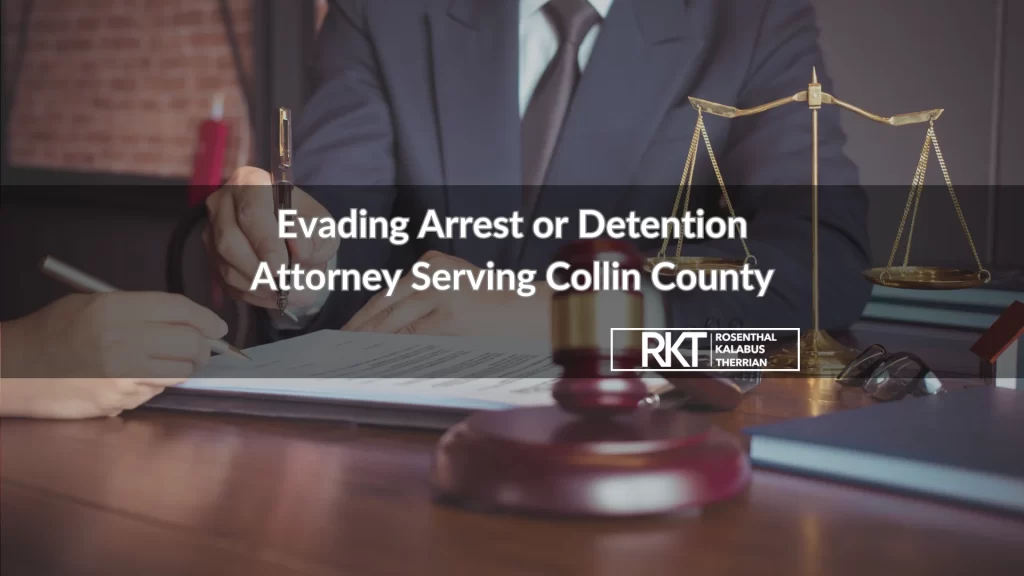
Evading arrest or detention in Collin County is a crime, even if you did so by accident. Maybe you didn’t see the lights or hear the sirens from a police vehicle approaching behind you. Or maybe you have had previous negative interactions with police and panicked, so you sped up instead of pulling your vehicle over. Regardless of your intentions, you could face serious legal penalties if you’re convicted of evading arrest or detention.
The Texas criminal defense lawyers of Rosenthal Kalabus & Therrian have decades of combined experience helping McKinney, Allen, Plano, and other Collin County residents get the best possible outcome after being charged with a crime. We have years of experience with Texas’s laws about evading detention and arrest. We’ll put this knowledge to use on your behalf.
You have the right to legal representation, and often, having a lawyer represent you can result in a better outcome than you could achieve without one. We can help you, no matter how serious your charges are. Call us today at (972) 369-0577.
What Is Evading Arrest or Detention?
The Texas Penal Code § 38.04 defines evading arrest or detention as intentionally fleeing from a police officer or federal investigator who is attempting to detain or arrest them. “Fleeing” could include driving away, running away, or even fleeing on a bicycle. Basically, any action other than stopping when indicated by the officer.
Evading detention or arrest isn’t the same as resisting arrest. Resisting arrest occurs when someone uses force to intentionally prevent a police person or their agent from making an arrest, searching, or taking someone away. It’s more than just running away; it’s a physically offensive attempt not to be arrested.
You may be found guilty of evading arrest or detention if you run away, drive away, or hide. You could be arrested for resisting arrest if you physically prevent yourself or another person from being arrested.
Legal Consequences of Evading Arrest or Detention
Evading arrest or detention is usually a Class A or B misdemeanor. A Class A misdemeanor has a maximum jail term of one year and a maximum fine of $4,000. In comparison, a Class B misdemeanor has a maximum jail term of 180 days and a maximum fine of $2,000. You’ll also have this charge on your criminal record. That could jeopardize your employment opportunities. The status of a professional license you hold. Your ability to get college financial aid or even your ability to secure housing. It could show up on a background check, too.
However, you may be charged with a third-degree felony if you’re fleeing arrest in a watercraft or vehicle and you’ve previously been convicted of evading arrest. You may also receive a third-degree felony charge if you cause serious bodily injury to another person in the course of evading arrest. If you cause the death of another person while evading arrest or detention, you could be charged with a second-degree felony.
We’ve all seen high-speed police chases in which a subject is evading capture. That person may be so focused on getting away that they break traffic laws, like running red lights, making dangerous lane changes, or speeding. These actions can easily cause a car collision, harming others in the path of the fleeing suspect. You could end up with not just the initial charge that the police offer was going to arrest you for but also a felony with a prison term of up to 20 years.
How a Criminal Defense Lawyer Can Help with Evading Arrest or Detention Charges
Reducing the penalty for an evading arrest charge, or possibly having it dismissed entirely, is much more likely if you have an experienced criminal defense lawyer representing you. Your attorney can investigate the situation and build a case to prove your innocence or find flaws in the prosecutor’s case against you.
Our legal team may challenge your charges on one of several grounds:
- The police officer had no lawful reason to detain or arrest you. Perhaps you were driving along, following the speed limit, and not breaking any laws. You may see lights flashing behind you, but since you aren’t doing anything wrong, you may believe the officer isn’t after you, so keep driving. The police officer may not have had reason to pull you over in the first place.
- Lack of probable cause. Perhaps the police officer didn’t have enough probable cause to detain or arrest you. They may suspect you committed a crime but lack evidence to make a lawful arrest.
- You didn’t know that the police were seeking to arrest you. You may have unwittingly left the area, not knowing that an arrest was imminent. In that case, you may not have intentionally fled.
We could also question the validity of an arrest warrant. Perhaps it was flawed. If the warrant was defective, then your arrest may have been unlawful.
Can My Family Get in Trouble If I Evade Arrest or Detention at Home?
Maybe. If they know that you will be arrested and they help you flee or hide from the arresting officer, they could be charged with obstructing the arrest. What, if anything, a friend or family member is charged with may depend on your situation. They may be charged with resisting arrest if they physically attempt to prevent you from being arrested. If they lie about where you are or help you evade an arresting officer, they, too, could face charges.
Do You Need Skilled Criminal Defense Representation?
Have you or a family member been charged with resisting arrest or evading arrest or detention in Collin County? The criminal justice system can be overwhelming, but you have rights, and the experienced criminal defense lawyers at Rosenthal Kalabus & Therrian can help protect them. Don’t risk your freedom by navigating the Collin County criminal justice system alone. Call us today at (972) 369-0577 – don’t wait.